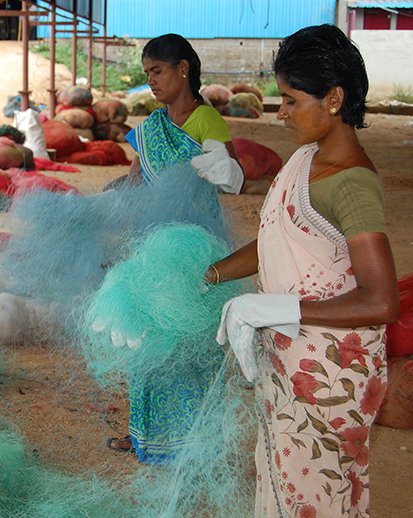Suppliers
The DSM Sustainable Procurement Program
As sustainability is a fundamental and integral part of our way of doing business, we must ensure that, working jointly with our suppliers, we deliver on our promise to reduce our environmental footprint and improve lives for people today and generations to come through our activities, products, solutions and innovations.
Our Sustainable Procurement Program comprises the following elements:
- Supplier development and evaluation program, in which we focus on assessing, auditing and further improving our suppliers’ sustainability performance by actively developing and following up on corrective actions
- Our Scope 2 program for reducing greenhouse gas emissions from purchased electricity
- Our Scope 3 program for reducing greenhouse gas emissions throughout our value chain, where we are working together with our suppliers on our collective carbon footprint and emissions
- A sustainable decarbonization of heat via the procurement of renewable fuels
|
|
2021 |
|
2020 |
||||
|---|---|---|---|---|---|---|---|---|
|
|
|
|
|
||||
Spend coverage SCoC |
|
95% |
|
93% |
||||
EcoVadis assessments |
|
411 |
|
351 |
||||
Together for Sustainability audits |
|
8 |
|
14 |
||||
Spend on local suppliers1 |
|
62% |
|
- |
||||
|
||||||||
The business principles most relevant for the supply chain are brought together in the Supplier Code of Conduct (SCoC) and structured along the three sustainability dimensions of People, Planet and Profit. The Supplier Code of Conduct (available on the DSM Supplier Website in eight languages) forms the basis on how we choose to do business and interact with our suppliers.
In 2021, we met our target level of 95% of our supplier spend covered by the SCoC. Through Together for Sustainability assessments and audits, we check that suppliers act in compliance with our norms and values. When suppliers cannot meet our expectations, we will work with them to define and execute an improvement plan.
Assessing sustainability in our supply chain
At DSM, we understand that connecting across complex value chains is not easy and requires strong collaboration. That is why we are a member of the Together for Sustainability (TfS) initiative. TfS aims to develop and implement a global supplier engagement program that assesses and improves sustainability practices in both environmental and social terms. This network grew further in 2021 by new members and celebrated its ten-year anniversary in 2021. We are active in several workstreams within TfS. More information about this program can be found on our company website.
In 2021, we continued our focus on driving improvement to support sustainability development in the value chain. Although value chains are complex and continued to be affected by COVID-19, sustainability development was kept in focus. We assessed 411 suppliers in 2021 through TfS, of which 373 were re-assessments, and. 65% of our re-assessed suppliers received an improved sustainability score, compared to 60% last year, which indicates that our suppliers are further engaging in sustainability.
On-site audits were heavily impacted by contact and travel restrictions in various regions on the globe throughout the year because of COVID-19. We performed fewer face-to-face audits in the more traditional manner while taking care of COVID-19 precautions. In 2020, we had piloted the first virtual audits through the TfS platform. The virtual audit used technology to conduct the audit, assessment, inspection, and oversight from a remote location. In evaluation, the virtual audit was perceived as comparable to a physical audit. However, the virtual aspect lacked typical physical experiences such as the perception of odor, or direct human interactions with the company. We consider that this type of audit is most suitable for follow-up audits and we do not consider this type of audit to be suitable for all suppliers. Technical capabilities as well as reliable, fast internet connections are essential to execute a successful virtual audit. Through TfS, we are exploring the further use of virtual audits besides the regular audits.
Capabilities to enhance and drive sustainability
Close collaboration with our strategic supply partners is key to bring our sustainability to the next level. Building capabilities and driving sustainability is closely connected to having subject-matter trainings available both for suppliers and our employees. We are actively contributing through assessments and audits, while participating in TfS workstreams to shape future supplier demands. Lastly, integrating sustainability as part of day-to-day business is expedited by having accessibility to all relevant data while on the job.
We played an active role in several workstreams in the TfS-initiative, such as governance & partnerships. Here, new memberships and the sharing of best practice across TfS are addressed. Besides this, we shared our view and experience regarding scope 3 program development in the newly inaugurated workstream on scope 3.
We actively support and utilize training opportunities given by the TfS initiative for our supply base as well as for our sourcing community. Three supplier training webinars designed to fit the time zones of North America, Latin America and Europe were shared in local languages. The aim of the webinars was to provide a deeper understanding of the TfS program, equip our suppliers with the understanding of how to utilize the Corrective Action Plan Tool and the action points following an assessment. The webinars attracted a high level of participation.
Further internal trainings in sustainability continued to be provided to our sourcing community. Three trainings were offered on the use of practical tools for integrating sustainability into the daily work of sourcing professionals, specifically on sustainable procurement, assessments and audits, and scope 3. These trainings are mandatory to relevant sourcing roles and aim to equip our colleagues with the necessary understanding to engage in relevant sustainability conversations with our suppliers.
To improve steering of sustainability in our supply chain, we launched a first prototype of a fully automated internal dashboard combining all available assessments and audits per strategic supplier. This increased transparency permits the tracking of supplier sustainability status and developments. The improved data accessibility will enable better incorporation of sustainability considerations into sourcing strategies and supplier selection.
Since 2021, the concept of sustainable tender has been included in all strategic sourcing projects within global logistics and packaging. With sustainable tender in the supplier selection process, we will be able to identify sustainable solutions from our suppliers, differentiate suppliers in terms of sustainable behavior, and influence the supply market.
Stakeholder engagement
In addition to working with our suppliers, we also work with external partners to enhance collaboration in the supply chain. These partners include Roundtable for Sustainable Palm Oil (RSPO), Friends of the Sea, and the Marine Stewardship Council.
Taking steps toward sustainable palm oil derivatives
We are actively taking steps to reduce deforestation by sourcing ingredients such as palm oil derivatives in a more sustainable way. For example, we are a member of the RSPO — a not-for-profit, multi-stakeholder organization aimed at making sustainable palm oil the market norm. We aim to have RSPO certification for all of our major production sites that use palm oil derivatives. Through our company, DSM Nutritional Products, we are a member of RSPO. DSM Food Specialties and DSM Nutritional Products met their objective to use 100% RSPO certified sustainable palm oil products using RSPO ‘Mass Balance’, ‘Segregated’ and ‘Book and Claim’ supply chain models by 2021. For more information on our use of palm oil, see the company website.
Responsibly sourced marine resources
Protecting our marine environment is important to us as a company. We are committed to the responsible and sustainable use of natural marine resources. We have ‘Friends of the Sea’ certification for all our fish oil purchases. This helps ensure that the fisheries involved in providing fish oil to produce our omega-3 product range are sustainable. Furthermore, we had already successfully attained 100% Marine Stewardship Council (MSC) certification for all our tuna oil suppliers in 2020. We are proud to partner with the MSC, the global gold standard for certification and eco-labeling of seafood, to offer MEG-3® tuna DHA oils and powders that are MSC Chain of Custody (CoC) certified. This certification guarantees ‘ocean to purchase’ traceability throughout the entire supply chain, providing assurance that our tuna DHA products can be easily traced to certified fisheries.
The BICEPS network
Our Global Logistics and Packaging team has connected with other shippers and industry bodies to advocate sustainability in the international transport market. Together, we formed the BICEPS Network, a network with the aim to reduce the CO2 emissions of the carriers. This led to an internationally verified rating system that provides an industry-recognized sustainability ranking of shipping lines and enables us to reward sustainable behavior.
Supplier projects
As part of our drive to foster better business through our supplier projects, our Procurement organization engages in proactive dialogue with suppliers to move the business agenda forward. In this context, DSM Sourcing pursues initiatives to create joint value, awareness and engagement regarding innovation, greenhouse gas emissions reduction and renewable electricity projects.
Supplier engagement is important to us. During 2021, in-depth discussions took place as part of our scope 3 supplier engagement program, CO2REDUCE, which addressed well over 50 suppliers across all businesses. More information on this program can be found in Scope 3 emissions.
In addition, we presented our sustainability story during company-wide events of some of our strategic suppliers, such as during the launch of a supplier’s sustainability program. These presentations demonstrated to a wider company audience the necessity and pull for sustainability from a customer’s perspective. We received positive feedback, helping to drive further engagement with these suppliers.
Every year, the DSM Procurement community presents awards to teams who have developed successful projects in various categories, with sustainability as a key selection criterion. The case outcomes should positively contribute to the commercial results of a DSM business unit or service unit and be exemplary in adjacent fields such as sustainability, digitization, or innovation. In 2021, more than 45 entries participated in the award. The winner was the Global steam trap monitoring initiative, which realized energy savings and CO2 reductions through online and wireless monitoring of the steam traps in our facilities. Our key supplier, Emerson Automation Solutions, applied the results by means of their developed technology and capabilities for global roll-out.
In 2021, hybrid working and the ongoing COVID-19 pandemic led to a permanent shift toward working from home. Our employees require ergonomic furniture and IT accessories in their homes to prevent long-term occupational injuries and allow for more efficient and convenient day-to-day work. We designed an effective sourcing strategy based on a sustainable tendering process with clear additional requirements regarding self-service capability, customized support, and digital solutions. The contracted supplier also provided a sustainable solution for our ‘old’ DSM furniture through refurbishing and re-use. Digital tooling enabled employees to order their tailored home-workplace package online. This program was rolled out in the Netherlands, Switzerland and the United States.





